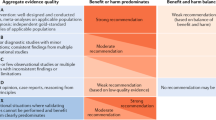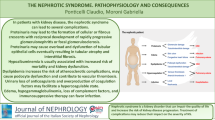Abstract.
Children with hemophilia B who receive exogenous factor IX infusions may rarely develop inhibitors to the exogenous factor IX and require desensitization. Nephrotic syndrome has recently been described in some of these children. We report the renal clinicopathological findings in a child with severe factor IX deficiency, requiring induction of an immune tolerance protocol, who developed nephrotic syndrome. Renal biopsy revealed peripheral capillary wall thickening and a spike appearance consistent with membranous glomerulonephritis. Electron microscopy showed prominent deposits throughout the thickness of the basement membrane. Factor IX dose reduction was accompanied by reversal of the child’s nephrotic syndrome without relapses.
Similar content being viewed by others
Author information
Authors and Affiliations
Additional information
Received October 15, 1997; received in revised form and accepted March 4, 1998
Rights and permissions
About this article
Cite this article
Dharnidharka, V., Takemoto, C., Ewenstein, B. et al. Membranous glomerulonephritis and nephrosis post factor IX infusions in hemophilia B. Pediatr Nephrol 12, 654–657 (1998). https://doi.org/10.1007/s004670050522
Issue Date:
DOI: https://doi.org/10.1007/s004670050522




